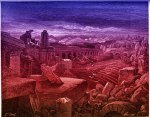 The prophet continues to point the way to a future Messiah in chapter 53 by telling us that He will sprout up “like a tender shoot” that has “taken root out of dry ground (vs 2). This is poetic language used to describe what has already been declared by Isaiah in other sections of his writings.
The prophet continues to point the way to a future Messiah in chapter 53 by telling us that He will sprout up “like a tender shoot” that has “taken root out of dry ground (vs 2). This is poetic language used to describe what has already been declared by Isaiah in other sections of his writings.
“And there shall come forth a Shoot out of the stock of Jesse [David’s father], and a Branch out of his roots shall grow and bear fruit. And the Spirit of the Lord shall rest upon Him—the Spirit of wisdom and understanding, the Spirit of counsel and might, the Spirit of knowledge and of the reverential and obedient fear of the Lord” – Isaiah 11:1-2
The prophet has been sending this message to Israel for quite some time now. There will be a Savior born who will come and destroy the enemies of God, yet this Savior will not come the first time as a warrior – but as a “tender shoot”. Isaiah is telling them that the Messiah will come as a baby – born right out of the “dry ground” – which is Israel. It is language like this which probably played a hand in the Israelites missing the significance of this prophecy. The LAST thing they pictured themselves as is “dry ground”! Their religious eyes were lying to them and convincing them that they were honoring God by their works. They were deceived. The Messiah would not be coming as a Conquering King the first time around. He would not ride in like the cavalry and save them as they imagined. Instead He will come in the least expected manner and save them internally first.
Next, the prophet calls Him a “Man of Sorrows” and “familiar with suffering” (vs 3). The reason Isaiah refers to the Messiah as a “man of Sorrows” is NOT because He possessed any sorrow – but because we did! This man would literally take our sorrows upon His own back and carried them (vs 4). He was familiar with suffering because He would literally take up (or bear) our sufferings (vs 4).
Sorrow – makob – “grief, anguish, pain, affliction, sorrow”
Sufferings – cholily – “grief, disease, sickness”
Despite how obvious that the meaning of the original Hebrew for “sufferings” is “sicknesses” – there are unfortunately millions of ill-informed Christians who do not believe this refers to physical healing. This, despite the fact that Matthew quotes Isaiah in his gospel and inserts the Greek word nosos which means “sickness, disease” as proof that Jesus was the awaited Messiah as He went about healing all the sick (Matt 8:16-17).
My friends, Jesus is the Messiah the prophet was speaking about. He was born as a baby (tender shoot) and grew up within the Israelite people (dry ground). He would take our sorrows, afflictions, sicknesses, grief, pain upon Himself when He went to the cross. Three days later He would rise from the dead – forever defeating death and all that He carried to the grave! You and I no longer are forced to be subjected to whatever happens in life. We are no longer under the curse of pain, affliction, anguish, disease, sickness, grief. You and I are free because of Jesus!
Believe that… and live!
Be fruitful & multiply,
PK




